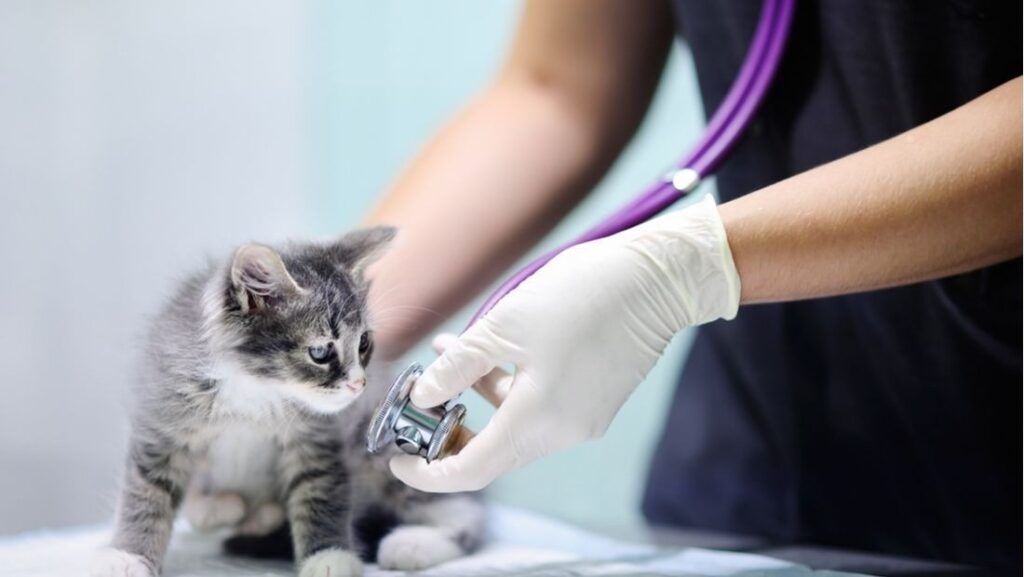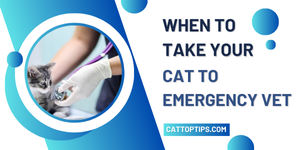When you own a cat, you want to make sure that your pet is content and healthy. One of the most important things you can do is to know when to take your cat to the vet. Regular check-ups and understanding when something seems wrong are key to keeping your cat in good shape. This guide will help you learn about different situations when a vet visit is necessary, how to tell if your cat is sick, and what to expect during those visits.

Regular Vet Visits: Why They Matter
Just like people, cats need regular check-ups to stay healthy. Most adult cats should see the vet at least once a year for a wellness exam. This check-up helps catch any potential health problems early and ensures that your cat is up-to-date on vaccinations.
Kittens and Their Vet Visits
When do kittens need to go to the vet? Kittens should visit the vet more often than adult cats. The first visit usually happens when they are six to eight weeks old. During this visit, the vet will check the kitten’s health, give necessary vaccinations, and discuss how to care for them as they grow. After the first visit, kittens typically need to return to the vet every three to four weeks until they are about 16 weeks old for their vaccinations.
Signs Your Cat Needs a Vet Visit
Sometimes, your cat may show signs that they need to see the vet. It’s important to pay attention to these signs so you can act quickly. Here are some common symptoms that might mean it’s time for a vet visit:
Change in Appetite: If your cat suddenly starts eating much less or more than usual, it could be a sign of a health issue. For example, not eating can indicate a problem with their teeth or stomach.
Lethargy: If your cat seems tired all the time and doesn’t want to play or move around, it’s a sign they might be unwell.
Vomiting or Diarrhea: Occasional vomiting or diarrhea is not uncommon in cats, but if it lasts more than 24 hours, you should contact your vet. Continuous vomiting can lead to dehydration and other serious problems.
Difficulty Breathing: If your cat is having trouble breathing or seems to be gasping for air, take them to the emergency vet right away.
Behavior Changes: If your cat suddenly hides more than usual or seems unusually aggressive, they may be in pain or feeling sick.
When to Take Your Cat to the Emergency Vet
Knowing when to take your cat to the emergency vet can be a matter of life and death. Here are some situations that require immediate attention:
Severe Trauma: If your cat has been in an accident, such as getting hit by a car, you should take them to the emergency vet right away.
Breathing Problems: Any signs of respiratory distress, like wheezing or difficulty catching their breath, are serious.
Seizures: If your cat has a seizure, it’s crucial to seek help immediately. Seizures can be a sign of serious health issues.
Bloody Urine or Stool: Finding blood in your cat’s urine or stool is not normal and needs to be checked by a vet.
Non-Stop Vomiting: If your cat keeps vomiting without stopping, they might be at risk for dehydration, so immediate care is essential.
Sneezing and Respiratory Issues
If you notice your cat sneezing frequently, you may wonder when to take your cat to the vet for sneezing. While it’s normal for cats to sneeze from time to time, if your cat is sneezing more than usual, it could indicate a health problem.
Common reasons for sneezing include allergies, respiratory infections, or dental issues. If your cat is sneezing a lot, especially if they also have a runny nose, coughing, or seem lethargic, it’s a good idea to make a vet appointment. Your vet can help figure out what’s wrong and provide the right treatment.
Newborn Kittens: Special Care
When should I take newborn kittens to the vet? Taking care of newborn kittens is a bit different from older cats. Kittens should have their first vet appointment at about two to three weeks old. During this visit, the vet will check their health and ensure they are gaining weight properly.
Kittens will need a series of vaccinations starting at six to eight weeks old. It’s very important to keep up with these appointments to help protect them from serious diseases.
Bringing Your Kitten to the Vet
When to bring your kitten to the vet?
First Visit: Kittens should see the vet when they are six to eight weeks old for their first vaccinations and health check.
Follow-Up Visits: After the first visit, kittens usually need to go back for more vaccinations every three to four weeks until they are about 16 weeks old.
Spaying/Neutering: Discuss spaying or neutering with your vet when your kitten is around five to six months old. This procedure helps prevent certain health issues and unwanted litters.
Understanding Your Cat’s Needs
To keep your cat healthy, it’s important to understand what is normal for them. Regularly observe your cat’s behavior and health, and don’t hesitate to reach out to your vet if you notice anything unusual. Trusting your instincts as a pet owner is vital; if something seems off, it’s always better to check with your vet.
What to Expect at the Vet
When you take your cat to the vet, it helps to know what to expect. During a routine visit, the vet will do a physical examination. They may check:
Weight: Keeping track of your cat’s weight helps determine if they are healthy.
Eyes and Ears: The vet will check your cat’s eyes and ears for any signs of infection or problems.
Teeth and Gums: Dental health is important for overall health, so the vet will look at your cat’s teeth and gums.
Heart and Lungs: Listening to your cat’s heart and lungs helps the vet assess their overall health.
Vaccinations: If your cat is due for any vaccinations, the vet will administer them during this visit.
Preparing for the Vet Visit
To make the vet visit as smooth as possible, here are some tips:
Use a Carrier: Get your cat used to their carrier before the visit. Make it a comfortable space with a soft blanket or toy.
Keep Calm: Your cat can pick up on your emotions. Stay calm and relaxed to help them feel more comfortable.
Write Down Questions: Before your visit, write down any questions you have for the vet. This will help ensure you get all the information you need.
Final Thoughts
Knowing when to take your cat to the vet is essential for their health and happiness. Regular check-ups, recognizing signs of illness, and understanding when to seek emergency care can significantly impact your cat’s quality of life. As a responsible pet owner, staying informed and proactive will help ensure your feline friend receives the best care possible.
If you’re looking for more tips and information about taking care of your cat, be sure to visit Cattoptips. A healthy cat is a happy cat, and being attentive to their needs will help you enjoy many years together!
FAQ Section
1. How often should I take my cat to the vet?
Adult cats should visit the vet at least once a year for a wellness check. Kittens need more frequent visits for vaccinations until they are about 16 weeks old.
2. What should I do if my cat is vomiting?
If your cat vomits more than once or shows other symptoms like lethargy, loss of appetite, or diarrhea, contact your vet for advice and possible evaluation.
3. How can I tell if my cat is in pain?
Signs of pain in cats include hiding, changes in appetite, vocalization, aggression, and unusual grooming habits. If you suspect your cat is in pain, consult your vet.
4. When is it necessary to visit the emergency vet?
You should visit the emergency vet for severe trauma, difficulty breathing, continuous vomiting, seizures, or if you notice blood in your cat’s urine or stool.
5. What vaccinations do kittens need?
Kittens typically need a series of vaccinations, including FVRCP (feline viral rhinotracheitis, calicivirus, and panleukopenia) and rabies vaccines, starting at six to eight weeks of age.
6. Should I take my cat for regular dental check-ups?
Yes, regular dental check-ups are important for your cat’s overall health. Your vet can recommend a dental care routine and check for any dental issues.
7. What can I expect during a vet visit?
During a vet visit, the vet will conduct a physical exam, check your cat’s weight, and possibly administer vaccinations. It’s also a good time to ask any questions you may have.


